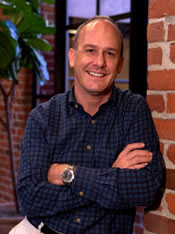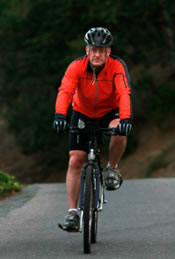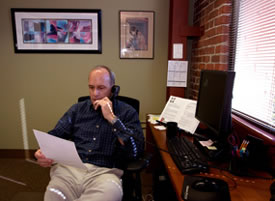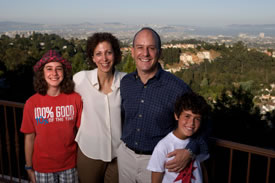Bill Hebert hopes for a quiet presidency
By Nancy McCarthy
Staff Writer
In the early 1980s, before he went to law school, Bill Hebert called a legal services group in San Francisco to offer his services. As it happened, the agency had a big case pending against video game giant Atari, which had closed a plant without notice.
“Bill threw himself into this case,” recalled Joan Graff, president of the Legal Aid Society-Employment Law Center that represented the workers. “He was pondering law school and I encouraged him to apply because he was so smart, so perceptive, so analytic and had every skill set I thought a lawyer needed and more.”
 |
| State Bar President-elect Bill Hebert expects a transitional year, with several new executives starting jobs |
As many of his later bosses learned, Hebert did anything asked of him “with tremendous effectiveness, totally right and more, the first time,” said Graff, who has remained friends with Hebert ever since. When he is sworn in as the State Bar’s 86th president later this month, his friends say the 49-year-old San Francisco lawyer will bring energy, dependability, tenacity, humor and smarts to the job.
Hebert himself, his self-deprecating humor on display, laughed, “There’s no reason that I should be president-elect of the State Bar. But I love the State Bar and I love what it does.”
Colleagues say his low-key, regular-guy style is just what the bar needs after a year of upheaval that included a veto of the bar’s dues bill by Gov. Schwarzenegger, the departure of the executive director and other top officers and a highly critical audit. “He’s not driven by ego,” said Wells Lyman, a member of the board of governors from La Mesa, who said he’s been impressed that Hebert understands that lawyers who are affected by the State Bar’s actions “are real people . . . The bottom line is, he’s a good person.”
Although he was unopposed and had virtually no bar experience when elected to the board of governors three years ago, Hebert survived four ballots to be elected president. His plans for the coming year are fairly modest, he says: “I’m gonna try to keep it in check.”
 |
| Hebert bikes through the Oakland hills near his home every morning |
With a calm approach and an emphasis on delegating tasks, he may just manage. Hebert wants to focus on the board, stressing communication, adequate debate and cohesion, and on bar stakeholders, including the courts and the legislature. Not high on his list are speaking engagements with local bars, considered by some board members as their principal constituency.
“I view the president as the person who presides over the board,” Hebert said. “My job is to figure out how to advance things, how can I help you do your job better.” His actions should be seen as a function of the office of the presidency, “not something Bill Hebert is doing. I’m just a suit.
“Hopefully we’ll do some good this year.”
Kathy Fisher, one of Hebert’s law partners who met him years ago when he was an associate at Morrison Foerster, said Hebert is “one of those rare people you really can depend on. What I think Bill brings to any organization is the fact that he’s a person who, when he says he’ll do something, he’ll do it. In this era where we all over-promise and under-deliver, Bill is a person you can depend on 100 percent of the time to keep his word and to only promise what he can deliver.”
Lori Schechter, Hebert’s wife of 15 years and a partner at Morrison Foerster, where the couple met, describes her husband as open-minded, a good listener and a consensus builder. “He consults before he acts,” Schechter said.
 |
| Hebert works at Calvo and Clark in San Francisco, where a partner calls him the "anchor" of the office |
A partner with Calvo and Clark with a business torts specialty, Hebert has come a long way from Iowa City, where he was born and raised with a brother and a sister. His dad ran a clothing store and his mother returned to work when Hebert was in kindergarten, working as a librarian and an administrative assistant in various medical departments at the University of Iowa.
A “not very good” running back on the Regina High School football team, Hebert enjoyed courtside seats as the yearbook photographer at basketball games, tried wrestling and track and during his senior year performed in “Damn Yankees.” An Eagle Scout and summer camp counselor, he ran for student body president and lost, leaving him “scarred for life,” he laughed. Most of his spare time, beginning at the age of 9, was devoted to working — a newspaper route, digging ditches for an electric company, bagging and stocking groceries at the local Hy-Vee.
The grocery store job paid off with an $1,800 a year scholarship, much needed when Hebert was accepted at Stanford. His mother tempered his elation when she said, “You know, you can’t go,” Hebert recalled. “There was a moment when I said, ‘Yes, I am going.’” His parents borrowed money, Hebert took loans and won scholarships, and worked his way through college.
He took a two-quarter freshman seminar on the First Amendment at Stanford, reading Supreme Court cases the first quarter and writing briefs the second. His instructor urged the future lawyer to study “anything but pre-law”; Hebert got degrees in English and Psychology.
 |
| Hebert poses on the deck of his home with Nicole, 11, wife Lori Schechter and Jordan, 9 |
As part of his work-study obligation, he worked first at the undergraduate library, then at the Faculty Club, where he waited tables, tended bar and learned to be a short-order cook. And his meals were free. “What a great job!” Hebert recalled. He also studied under William DeMent, a leading authority on sleep disorders, and wound up working at a sleep lab on campus, housed in a dorm. That fortuitous arrangement included a free room.
Although Hebert still wanted to pursue law, he could never figure out what lawyers actually do. So after graduation, he landed a job (after waiting tables in San Francisco) at a law firm and volunteered for the legal aid society. Although he had the impression that law might not be intellectual or interesting, the lawyers he worked for “were doing really interesting stuff, really fun cases. They were just fabulous people.”
Bill Campbell, a San Francisco lawyer who first hired Hebert in 1983, said the newly minted graduate was willing to do anything assigned to him, and did it well. “He’s one of the most personable people you can imagine,” Campbell said. “Everyone loved him. Whatever the assignment was, he just dug in and did a great job.”
Hebert studied at Boalt, lived in San Francisco’s Mission District, continued working at law firms and took a second job as a security guard. He knew by the time he graduated that he wanted to handle business torts, but inspired by a speech by former Stanford president Donald Kennedy urging graduates to take seriously their obligation to perform community service, Hebert also wanted to pursue that goal. Morrison Foerster, where he did a summer stint and worked 30 hours a week while still in school, fit the bill. He worked for Fisher, who recalls being impressed, so much that years later, she “begged” him to join her at Calvo.
There, she said, he’s the anchor of the office. “Bill’s a very good teacher and mentor of younger associates . . . teaching them how to do a filing and how to take a case from beginning to end. He has always been great at that. I knew he would be the right person to really be the working lawyer, mentor, player/coach at the office.”
Before joining Calvo, Hebert also worked at the San Francisco City Attorney’s office, Coudert Brothers and K&L Gates. His interest in public service remains solid, and beefing up the Justice Gap Fund and the bar’s legal services programs are among his presidential priorities.
He hopes to take steps to assure confidentiality for judicial applicants going through the JNE commission, including putting information on an encrypted thumb drive and installing security software, and wants to deliver the new Rules of Professional Conduct to the Supreme Court. As head of the board’s discipline committee this year, he strongly supports the bar’s regulatory efforts. “Every time we kick someone out, the value of my bar card goes up,” he said.
And he will preside over a transitional year. The board expects to hire a new executive director this month, and recently hired a new general counsel and chief trial counsel. Thinking out loud, Hebert raised the possibility of shuffling top staff, adding a chief operating officer under the executive director, who he said must hold a law degree. “You can’t have just a titular executive director,” he explained.
He offered some support for a recent proposal to the legislature that board members be appointed rather than elected, but he believes lawyers should hold a majority on the board, which currently includes six public members.
Although acknowledging that the bar presidency will consume much of his time in the coming year, Hebert’s true priorities are with his family. He and his wife have two children, Nicole, 11, and 9-year-old Jordan, and as busy parents, do a fair amount of juggling. “We bend with each other’s schedules,” Schechter said, adding that depending on caseloads and work responsibilities, they stagger their parenting duties.
Hebert starts virtually every day with a 40-minute bike ride through the Oakland hills, where the family lives in a home built after the 1991 East Bay firestorm. As a photographer shot pictures of the next bar president pedaling uphill recently, he joked about becoming a paparazzi target by virtue of his election. He quickly dismissed any delusions of grandeur, however, when he retrieved a garbage can from the street after stowing his bike, acknowledging that not much will change in his day-to-day life in the coming year.
“I like to spend as much time as I can with my wife and kids,” Hebert said. He’s a trustee of the kids’ school and chairs its development committee, and he sits on the boards of the Public Interest Law Project and the San Francisco Legal Aid Society.
Although many of his predecessors have become judges, and Hebert was vetted by the JNE Commission while between jobs a few years ago, he says he’s no longer interested in donning a black robe. “I’m so happy with my practice right now it’s hard to imagine being a judge.”